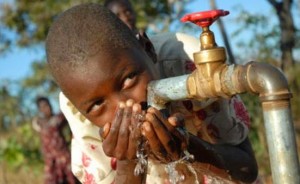US launches new $100m WASH Strategy in Ghana
 The United States Ambassador to Ghana, Madam Virginia Palmer, has joined Ghana’s Minister for Sanitation and Water Resources, Dr. Freda Prempeh, to launch the U.S. Global Water Strategy High Priority Country Plan for Ghana.
The United States Ambassador to Ghana, Madam Virginia Palmer, has joined Ghana’s Minister for Sanitation and Water Resources, Dr. Freda Prempeh, to launch the U.S. Global Water Strategy High Priority Country Plan for Ghana.
The United States, through the United States Agency for International Development (USAID), plans to invest approximately $100 million in Ghana’s water, sanitation, and hygiene (WASH) sector over the next five years.
A statement issued by the Embassy and copied to the Ghana News Agency (GNA) said this was in addition to $89 million that USAID had already invested since 2009.
The Country Plan for Ghana has the target of mobilizing an additional $20 million from both the public and private sectors over the next five years.
Poor WASH services have a negative effect on health, education, and economic development, and there are significant regional disparities in Ghana.
For example, access to clean water varies from 98 percent in the Greater Accra Region to 55 per cent in the North East Region.
Also, while the national average for open defecation in rural areas stands at a little over 30 percent, the five regions of northern Ghana have an open defecation rate of above 50 percent.
According to the statement, Ambassador Palmer reaffirmed the U.S. support to Ghana’s WASH sector, saying; “The United States Government looks forward to continuing our partnership to ensure that everyone in Ghana has access to clean water, sanitation, and hygiene to improve health and promote economic development.
Together, we’ll ensure clean water and sanitation for all.”
Since 2020, Ghana has been one of 22 High Priority Countries designated by the U.S. Government for increased WASH investment.
The Biden-Harris Administration recently elevated water as a national security and foreign policy priority when Vice President Harris launched the first-ever White House Action Plan on Global Water Security on June 1, 2022.
USAID has been a key partner in the WASH sector in Ghana since 2009, making substantial contributions to improve public health.
Water insecurity endangers public health, undermines economic growth, deepens inequalities, and increases the likelihood of conflict.
Strong water, sanitation, and hygiene services, the statement added, remained critical to increasing resilience in the face of global shocks and stressors, including pandemics and climate change.
By 2027, USAID aims to reach an additional one million people in Ghana with access to safe and sustainable drinking water and sanitation services.
The USAID is the lead U.S. Government agency that works to end extreme global poverty and enable resilient, democratic societies to realize their potential.
Its work advances an integrated approach to development and promotes accountability, sustainable systems, and inclusive development.
Source: GNA
